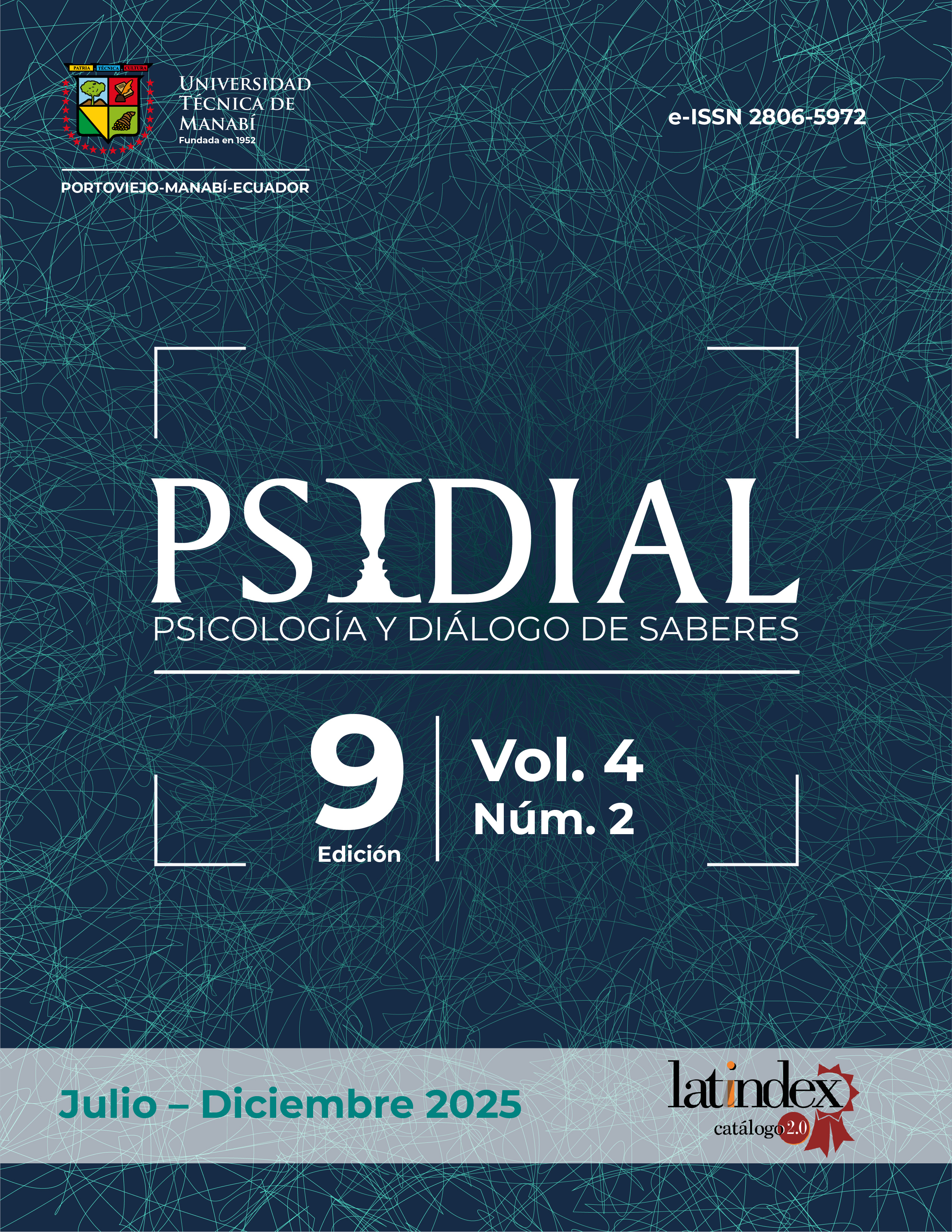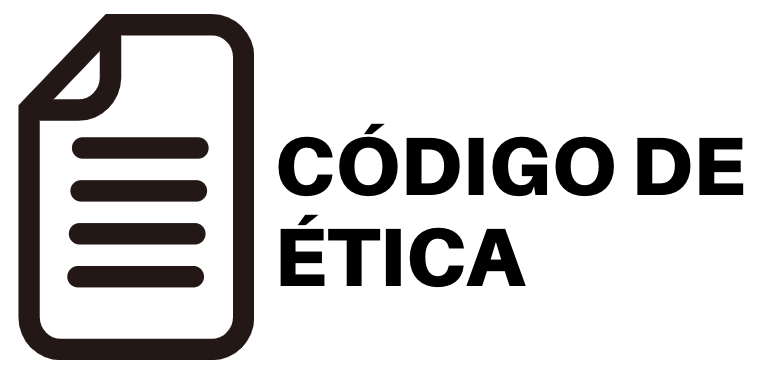Estilo de vida de cuidadores familiares de adultos mayores: estudio descriptivo transversal en Cascol, Ecuador
DOI:
https://doi.org/10.33936/psidial.v4i2.7686Palabras clave:
personalidad; estilo de vida; síndrome del cuidadorResumen
El cuidado de adultos mayores con discapacidad implica importantes desafíos personales y sociales, lo que motiva la necesidad de comprender cómo esta labor afecta el estilo de vida de quienes la desempeñan. Este estudio tuvo como objetivo caracterizar los constituyentes personológicos del estilo de vida de 47 cuidadores de la comunidad de Cascol, Cantón Tosagua, Manabí, Ecuador, durante 2025, a partir de un enfoque descriptivo y transversal. Los participantes, en su mayoría mujeres adultas e hijas de las personas cuidadas, presentan un sistema de roles predominantemente restringido y centrado en la familia (89,4%), lo que limita su desarrollo en otros ámbitos personales y sociales. Aunque más de la mitad logra cierto equilibrio entre actividades psicosomáticas, funcionales, sociopsicológicas y espirituales (55,4%), prevalecen redes de contacto amplias, pero de baja funcionalidad (66%), evidenciando un bajo nivel de apoyo emocional. La orientación temporal se enfoca principalmente en el futuro (36,2%), favoreciendo la planificación, aunque un porcentaje significativo carece de una orientación clara. La mayoría alcanza un nivel medio de autorrealización (72,3%), mientras que un 23,4% reporta niveles bajos, lo que impacta negativamente en su bienestar. En cuanto a los estilos de afrontamiento, predomina la falta de estrategias definidas (37,2%), seguida del afrontamiento centrado en la solución de problemas (30,2%). Estos hallazgos reflejan la necesidad de fortalecer los recursos psicológicos y sociales de los cuidadores para promover estilos de vida más saludables y prevenir riesgos a su salud mental.
Descargas
Citas
Arrascue León, L. E., & Mora Ramírez, J. R. D. M. (2013). Estilos de vida del cuidador principal de personas con secuela de accidente cerebro vascular en la Clínica Neurológica-Chiclayo, 2013. https://repositorio.uss.edu.pe/handle/20.500.12802/239
Asociación Americana de Psicología (2019). Cuidado de adultos mayores: El impacto emocional y físico en los cuidadores. https://www.apa.org/pi/about/publications/caregivers
Ballester Ferrando, D., Juvinyà Canal, D., Brugada Motjé, N., Doltra Centellas, J., & Domingo Roura, A. (2006). Cambios en los cuidadores informales en cuanto a estilos de vida, relaciones y alteraciones de salud mental. Presencia: Revista de Enfermería de Salud Mental, 2(4). https://dugi-doc.udg.edu/handle/10256/9007
Bueno, M. V., & Chase, J. A. D. (2023). Gender differences in adverse psychosocial outcomes among family caregivers: A systematic review. Western Journal of Nursing Research, 45(1), 78-92. https://doi.org/10.1177/01939459221099672
Cham, C. Q., Ibrahim, N., Siau, C. S., Kalaman, C. R., Ho, M. C., Yahya, A. N., … Lee, K. W. (2022). Caregiver burden among caregivers of patients with mental illness: A systematic review and meta-analysis. Healthcare, 10(12), 2423. https://doi.org/10.3390/healthcare10122423
Collado, G. (2023). Estilo de vida y sobrecarga en cuidadores de pacientes con deterioro cognitivo. XV Congreso Internacional de Investigación y Práctica Profesional en Psicología. https://www.aacademica.org/000-009/243
Cruz, J. R. (2013). Estilo de vida de la persona con diabetes mellitus tipo 2 y de su cuidador primario. https://pesquisa.bvsalud.org/portal/resource/pt/biblio-980249
Daliri, D. B., Aninanya, G. A., Laari, T. T., Abagye, N., & Afaya, A. (2024). Coping strategies used by informal family caregivers of individuals living with mental illness in the Upper East Region of Ghana: A qualitative study. BMJ Open, 14(7), e084791. https://doi.org/10.1136/bmjopen-2024-084791
Dunst, C. J. (2022). Functional social support and psychological health and functioning: A meta-analysis of studies of parents of children and adolescents with disabilities. European Journal of Psychological Research, 9(3), 62-87.
del Carmen Monserrat, P. G. M., & David, V. L. O. (2023). Estilo de vida en cuidadores de pacientes con diabetes mellitus. Revista Médica. https://revistamedica.com/estilo-vida-cuidadores-pacientes-diabetes-mellitus/
Freedman, V. A., Wolf, D. A., & Spillman, B. C. (2024). Family structure and caregiving burden: Implications for future generations. The Gerontologist, 64(2), 210-222. https://doi.org/10.1093/geront/gnad045
Levy, S., Hirschman, K., Matus, A., Thomas, G., Riegel, B., & Ashare, R. (2024). Do coping style and future time perspective relate to surrogate decision-making preparedness? Aging and Mental Health, 1-7. https://doi.org/10.1080/13607863.2024.2424478
Levy, S., Quinn, R., Stawnychy, M. A., Thomas, G., Goba, M., & Gordon, D. (2025). Do coping style and future time perspective relate to surrogate decision-making preparedness? Aging & Mental Health, 29(5), 874–880. https://doi.org/10.1080/13607863.2024.2424478
Liu, H., Lou, V. W. Q., & Xu, S. (2024). Randomized controlled trials on promoting self-care behaviors among informal caregivers of older patients: A systematic review and meta-analysis. BMC Geriatrics, 24, 86. https://doi.org/10.1186/s12877-023-04614-6
López Gamboa, N. M. (2021). Cambio de estilo de vida y resiliencia en los cuidadores de personas con discapacidad beneficiarios del bono Joaquín Gallegos Lara del cantón Píllaro [Tesis de grado]. Universidad Técnica de Ambato. https://repositorio.uta.edu.ec:8443/handle/123456789/32926
Martín, M., Salvado, S., Rico, J. M., Lanz, P., & Taussig, M. (1996). Adaptación para el medio español de la Escala de Sobrecarga del Cuidador (Caregiver Burden Interview) de Zarit. Revista Gerontología, 6, 338-346.
Mayo Parra, I. (1999). Estudio de los constituyentes personológicos del estilo de vida [Tesis doctoral, Universidad de La Habana]. REDI. https://redi.cedia.edu.ec/document/215055
Mayo Parra, I., & Gutiérrez Álvarez, A. K. (2017). Estudio del estilo de vida: Teoría fundamentada e inducción analítica. Revista Iberoamericana de Psicología, 10(1), 29–36. https://reviberopsicologia.ibero.edu.co/index.php/ripsicologia/article/view/rip.10104:contentReference[oaicite:15]{index=15}
Mehrab-Mohseni, T., Pashaeypoor, S., Nazari, S., & Sharifi, F. (2023). Effects of self-care education based on the family-centered empowerment model on functional independence and life satisfaction among community-dwelling older adults: A randomized controlled trial. Journal of Geriatric Nursing and Midwifery, 20(1), 56-66.
Organización Mundial de la Salud. (2015). Informe mundial sobre el envejecimiento y la salud. Ginebra: OMS. https://www.who.int/es/publications/i/item/9789241565042:contentReference[oaicite:7]{index=7}
Pedraza, C. A. (2017). Síndrome del cuidador: Conceptualización y desafíos en su abordaje. Revista de Psicología Clínica Contemporánea, 5(1), 45-59.
Puga, F., Wang, D., & Bibriescas, N. (2023). Role captivity, daily social isolation, and the mental health of dementia caregivers. Innovation in Aging, 7(Suppl 1), 457-458. https://doi.org/10.1093/geroni/igad123
Rahman, M. R., Aktar, N., & Islam, F. (2025). Assessment of the psychological burden among family caregivers of people living with dementia, Parkinson’s, and Alzheimer’s disease using the Zarit Burden Interview in Bangladesh. Brain and Behavior, 15(5), e70527. https://doi.org/10.1002/brb3.70527
Sakwape, T., Mokoena, L., & Khumalo, M. (2023). Identifying the sources and impacts of caregiver fatigue and burnout among mental health caregivers: A qualitative approach. Environment and Social Psychology, 8(3). https://doi.org/10.54517/esp.v8i3.1539:contentReference[oaicite:23]{index=23}
Wendlandt, B., Hough, C. L., Curtis, J. R., & Engelberg, R. A. (2024). Novel definitions of wellness and distress among family caregivers of patients with acute cardiorespiratory failure: A qualitative study. Annals of the American Thoracic Society, 21(2), 123–130. https://doi.org/10.1513/AnnalsATS.202310-904OC
Yu, L., Chen, X., & Zhang, W. (2025). Mediating effect of social support between caregiver burden and quality of life among family caregivers. International Journal of Nursing Sciences, 12(2), 123–130. https://doi.org/10.1016/j.ijnss.2024.12.007:contentReference[oaicite:31]{index=31}
Publicado
Número
Sección
Licencia
Derechos de autor 2025 Huber Feliberto Quiñonez Lara, Israel Mayo Parra

Esta obra está bajo una licencia internacional Creative Commons Atribución-NoComercial-CompartirIgual 4.0.




















